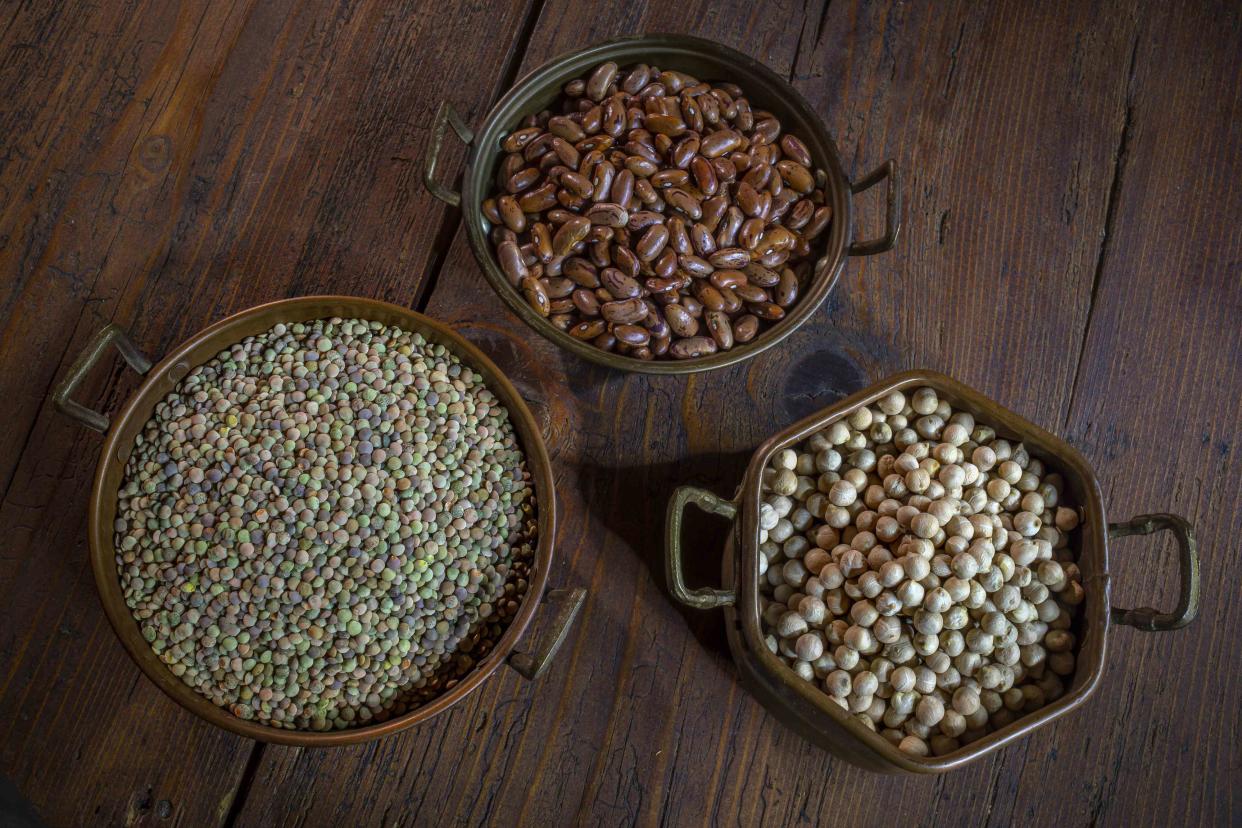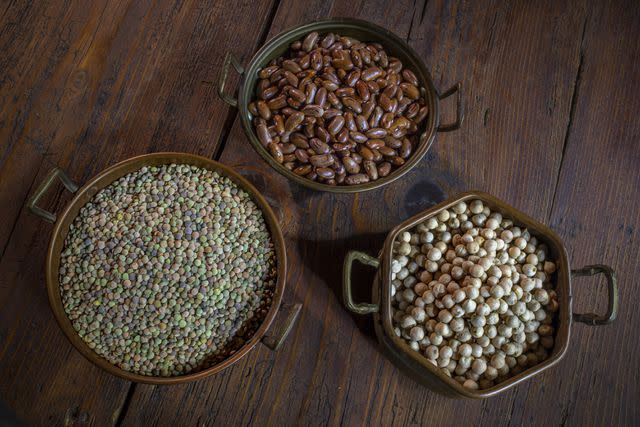Best and Worst Foods for Gut Health

Alberto Gagliardi / Getty Images
Medically reviewed by Roxana Ehsani, MS
There is no concrete definition of "gut health," but it often refers to the health of the 300–500 different species of microorganisms—such as bacteria—that live in the large intestine and make up the gut microbiome, or gut microbiota.
The gut microbiome bacteria help break down food for the body to use efficiently. Gut health is also linked to overall health. Approximately 70% of the body's immune system is in the gut. Gut health has also been associated with autoimmune diseases, gastrointestinal disorders, mental health, cardiovascular disease, and more.
Some foods we eat—such as yogurt and whole grains—can help promote a healthy gut microbiome.
This article will discuss types and examples of foods to eat for gut health, some foods to limit or avoid, and the importance of probiotics versus prebiotics.

Alberto Gagliardi / Getty Images
Five Gut Health Foods to Try
The gut acts like a gatekeeper for the body. Along the walls of the intestines, a layer of cells creates a boundary between what is inside the gut and what is absorbed and circulated through the body. Along with a mucosal layer, gut microbiota, and the immune system, these cells form the gut barrier.
A rich, diverse microbiota is necessary to withstand external threats.
Eating a nutritionally balanced diet with a wide variety of foods that promote gut health is essential for:
Maintaining a healthy gut microbiome
Protecting the intestinal barrier
Supporting gut health
Five foods that are good for your gut health are outlined below.
Fiber
Getting enough dietary fiber is important for gut health, including maintaining the diversity of gut microbiota and lowering the risk of infection from pathogens.
A high-fiber diet can also help with the following:
Digestion
Absorption of nutrients
Prevention of constipation
It has also been linked with a reduced risk of health conditions such as heart disease, type 2 diabetes, and colon cancer.
Conversely, a low-fiber diet may reduce the amount of beneficial microbiota and also increase the growth of pathogenic (potentially disease-causing) bacteria.
Aim for about 18–38 grams of fiber per day from various sources as a general guideline.
Foods that are high in fiber include:
Whole grains, such as barley, brown rice, oats, buckwheat, wholewheat/whole grain pasta, crackers, and unsweetened cereals
Fruits and vegetables
Nuts and seeds
Legumes
Beans, such as kidney, navy, white, lima, and pinto
Peas, such as green, black-eyed, split, and chickpeas
Lentils
Fermented Foods
Fermented foods have been through a process that uses yeast and bacteria to break down their sugars.
Live cultures are used to make fermented foods. Common strains include lactobacillus and bifidobacteria.
A diet rich in fermented foods has been associated with increased microbial diversity and may decrease some markers of inflammation.
High heat can kill the beneficial probiotics (live microorganisms intended to have health benefits) in fermented foods. Mix them in at the end or use them as a topping instead of cooking them on high heat.
Fermented foods include:
Sauerkraut, choose refrigerated
Kombucha (fermented tea drink)
Kimchi (made with fermented vegetables)
Tempeh (made from fermented soybeans)
Kefir (fermented milk)
Sourdough
Miso (made with fermented soybeans), choose refrigerated
Fermented vegetables
Pickles in salt, not vinegar
Certain aged cheeses (look on the label for live and active cultures)
Farmer's cheese (dry curd cottage cheese) or fermented cottage cheese
Probiotic drinks such as beet kvass or apple cider
Polyphenols
Polyphenols are compounds found in plants that are not easily digested in the stomach. Microorganisms in the colon metabolize them.
More research is necessary, but polyphenols may promote helpful gut bacteria and inhibit invasive species.
Sources of polyphenols include:
Fruits, including blueberries, grapes, cherries, strawberries, apples, and pears
Vegetables, including cabbage, broccoli, cauliflower, Brussels sprouts, and tomatoes
Soy products
Spices such as ginger, turmeric, and red pepper flakes
Nuts, peanuts, and seeds
Coffee
Dark chocolate
Cocoa
Omega-3 Fatty Acids
Omega-3 fatty acids are a family of polyunsaturated fatty acids that may help restore balanced healthy microbiota, strengthen the gut wall, and decrease inflammatory microorganisms.
Sources of omega-3 fatty acids include:
Cold water fatty fish, such as sardines, salmon, tuna, mackerel, and herring
Nuts and seeds, including flaxseeds, walnuts, and chia seeds
Oils, such as canola and soybean
Water
Getting enough liquids—particularly water—is essential for gut health.
Water helps gut health by:
Assisting with the breakdown of food, allowing the body to absorb nutrients
Softening stools
Preventing constipation
Working with fiber (fiber absorbs water and needs water to provide its benefits)
Adequate water consumption may also be associated with an increased diversity of gut bacteria.
Three Gut Health Foods to Avoid or Limit
Regarding gut health, it's more important to look at the overall diet than each individual food, but some foods are better to limit or avoid. Foods to avoid for a healthy gut are outlined below.
Ultra-Processed Foods
Though most foods involve some level of processing, try to eat foods that are as close to their natural state as possible. For example, a whole apple is a better source of fiber than applesauce or apple juice.
Highly processed foods may contain added sugar, salt, and saturated or trans fats. This can influence gut health.
They may also have additives like emulsifiers and artificial sweeteners. While food additives are generally considered safe, some studies suggest they can negatively influence the gut microbiota.
Ultra-processed foods may include:
Deli meats
Many breakfast cereals
Many packaged snacks
Sweet desserts
Ready-made meals
Greasy Fried Foods
Foods that are high in saturated fats—such as fried foods, burgers, chips, and other greasy foods—can be difficult to digest and lead to stomach upset such as heartburn.
Artificial Sweeteners
Though more research is necessary, some evidence suggests that certain artificial sweeteners, including aspartame, sucralose, and saccharin, may negatively impact the balance and diversity of the gut microbiota.
Probiotics vs. Prebiotics
A closer look at probiotics and prebiotics:
Probiotics Facts
Probiotics are live microorganisms that provide health benefits when administered in adequate amounts.
Probiotics can be found in certain foods, such as fermented foods. They are also available as a supplement containing live bacteria.
Probiotics supplements are poorly regulated and can vary widely in efficacy.
Healthy adults and older children who are not on antibiotics likely do not need probiotic supplements. They may be helpful in certain circumstances, such as with older adults and young children, after antibiotic use, or for diarrhea. Talk to your healthcare provider before taking probiotic supplements.
When getting probiotics from food, eating foods containing probiotics regularly is best, though no established ideal frequency for doing so exists.
Prebiotics Facts
Prebiotics support increased levels of short-chain fatty acids and feed beneficial microbiota.
Prebiotics include indigestible carbohydrates and fibers such as inulin, pectins, resistant starches, gums, and fructooligosaccharides.
Prebiotic supplements exist, but many foods contain them naturally.
Bonus: Gut Health Foods With Prebiotics
Prebiotics are not found in all high-fiber foods, but many foods do contain them.
The highest sources of prebiotics include raw:
Jerusalem artichokes
Garlic
Onions
Asparagus
Leeks
Bananas
Dandelion greens
Seaweed
Prebiotics can also be found in foods such as:
Legumes, including beans, chickpeas, and lentils
Whole grains, such as barley, wheat, oats, and rye bread
Nuts, including cashews, almonds, and pistachios
Maple syrup
Yacon root
Jicama roots
Probiotics and Added Sugar
Some commercial foods with probiotics contain added sugar. These can include yogurts, kombucha, and other probiotic drinks.
Look for versions without added sugar or artificial sweeteners. One example of this is plain yogurt.
Summary
The microorganisms in our gut—called the microbiome or microbiota—can affect our health. What we eat can impact our gut health.
Eating a diet that includes a wide variety of foods high in fiber, probiotics (such as fermented foods), polyphenols, and omega-3 fatty acids can help support gut health. Getting enough fluids, particularly water, is essential to keep the gut healthy.
Foods that contain prebiotics, such as garlic, onions, and whole grains, help to feed beneficial microbiota.
Ultra-processed foods, greasy foods, and artificial sweeteners can negatively affect gut health and are best limited or avoided.

